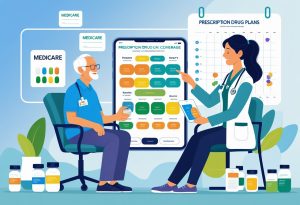A home care assessment is a crucial step in ensuring the quality of life and well-being of your loved ones who may need assistance. This evaluation identifies their specific needs and challenges, guiding the appropriate services to enhance their daily living. By understanding these needs, you can make informed decisions that lead to better care and support within the home environment.
At The Modern Medicare Agency, we recognize that navigating care options can be overwhelming. Our licensed agents are here to help you every step of the way. They can assess your Medicare options to ensure you find the right fit without the burden of hidden costs, making it easier for you to focus on what truly matters: the health and happiness of your loved ones.
Understanding Home Care Assessments
Home care assessments are crucial for determining individual care needs and establishing a tailored care plan. These assessments involve multiple healthcare professionals to ensure comprehensive understanding and support.
Definition and Purpose
A home care assessment is a formal evaluation process conducted to identify an individual’s specific health, safety, and personal care needs. This process typically starts with an assessment form filled out by the client or their family.
The primary purpose is to create a personalized care plan that outlines the required services and support. This plan is essential for ensuring quality care and developing a roadmap that aligns with your unique preferences and circumstances. It allows for better coordination among caregivers and promotes effective communication between all parties involved.
The Role of Health Professionals
Health professionals, such as nurses or care coordinators, play a pivotal role in the home care assessment process. They are responsible for conducting the assessment, which includes evaluating both physical and emotional health.
During the assessment, they will ask detailed questions about your medical history, lifestyle, and daily activities. Their insights help to identify any necessary medical interventions or support services. By involving these professionals, you ensure that all health concerns are thoroughly addressed, leading to a more effective and comprehensive care plan.
Types of Assessments
There are various types of home care assessments designed to meet different needs. Common formats include initial assessments, follow-up assessments, and specialized assessments.
- Initial Assessments: These occur when entering a home care program and establish baseline information.
- Follow-Up Assessments: Conducted periodically to monitor progress and adjust care plans as needed.
- Specialized Assessments: Focus on specific conditions, like Alzheimer’s or mobility issues.
Each type ensures that your unique situation is continually addressed and modified based on changing needs. By engaging with The Modern Medicare Agency, you can access licensed agents who guide you through these assessments, helping identify Medicare packages that fit your needs without hidden fees.
Identifying Care Needs
Assessing care needs involves a comprehensive understanding of an individual’s physical, emotional, and daily living requirements. Ensuring that these needs are met is essential for improving quality of life and supporting independence.
Physical and Emotional Needs
Physical care needs encompass mobility, personal hygiene, and assistance with medical conditions. Assessors should identify limitations caused by illness or disability, focusing on any necessary therapies or interventions. Ensuring safe mobility and personal care not only facilitates daily routines, but also enhances self-esteem and autonomy.
Emotional needs play a crucial role in well-being. Understanding feelings of loneliness, anxiety, or depression is vital. Engaging in conversations about emotional support systems, including family interaction and mental health services, can help in developing strategies that address these needs effectively.
Activities of Daily Living (ADLs)
Activities of Daily Living (ADLs) are essential tasks that individuals perform routinely. They include bathing, dressing, eating, and using the bathroom. Assessors should evaluate how well an individual performs these tasks.
If someone struggles with these daily activities, determining the level of assistance required is crucial. This may involve arranging help from caregivers or exploring assistive technology. Focus on maintaining independence in these areas allows individuals to feel empowered and dignified in their routines.
Nutritional and Medication Needs
Nutritional needs are vital for maintaining health. Assessors should review dietary habits and any specific nutrition requirements, such as restrictions or supplements needed due to medical conditions. This information can help develop meal plans that cater to specific health profiles.
Medication management is also critical. It is important to track prescriptions, dosages, and schedules to prevent errors. A system for reminders or an organization method can enhance adherence to medication regimens. The Modern Medicare Agency can assist with understanding these needs in the context of Medicare coverage. Our licensed agents are experts in navigating the options best suited to your specific requirements and budget, ensuring you receive the best support without unnecessary costs.
Assessing the Home Environment
Evaluating the home environment is crucial for determining the level of care needed. This assessment focuses on identifying safety concerns, living conditions, and support systems that can significantly affect daily activities.
Safety Hazards and Accessibility
In assessing safety hazards, you should identify potential risks that could lead to falls or injuries. Look for items like loose rugs, electrical cords, or cluttered spaces that may obstruct movement.
Accessibility is equally important. Ensure that entrances and hallways are wide enough for assistive devices like wheelchairs or walkers. Consider installing grab bars in bathrooms and non-slip mats in kitchens and on stairs to enhance safety.
Regularly checking smoke detectors and ensuring adequate lighting throughout the home can also make a significant difference.
Living Conditions and Home Adaptability
The living conditions of your home significantly impact well-being. Evaluate the cleanliness and organization of each space. A cluttered home can contribute to stress and confusion.
Home adaptability involves determining whether the space can be modified to meet changing needs. This might include rearranging furniture for easier navigation or upgrading bathrooms to accommodate assistive devices.
You can also consider ramps for wheelchair access and wide doorways for easier maneuvering. These adjustments can create a safer and more comfortable living environment.
Availability of Support Systems
Having a strong support system is essential for effective home care. Identify family members or friends who can assist with daily tasks or provide emotional support.
Additionally, explore community resources such as local home care services or volunteer organizations that offer assistance. These support systems can alleviate some burdens and enhance your independence.
The Modern Medicare Agency can also provide essential information on Medicare packages that work best for your unique needs. Our licensed agents are dedicated to finding the best options for you without any extra fees. This personalized service ensures you understand your choices while receiving the support you need.
Evaluating Home Care Options
When considering home care options, it is crucial to understand the differences between various settings and caregiver types. Each choice provides unique benefits and can significantly impact the level of care you or your loved one will receive.
In-Home Care vs. Assisted Living
In-home care allows individuals to receive support in the comfort of their own home. This option is often less disruptive and can be tailored to your needs. Caregivers provide assistance with daily activities such as bathing, meal preparation, and medication management.
On the other hand, assisted living facilities offer a communal living environment with access to round-the-clock care. They provide services like social activities and medical support, which can be beneficial for those needing constant supervision. Evaluating individual preferences, health conditions, and financial implications can aid in making an informed choice.
Agency-Provided Care Versus Independent Caregivers
Choosing between agency-provided care and independent caregivers is essential. Agency-provided care typically ensures a level of professionalism and accountability. Agencies often conduct background checks and train their staff, giving you peace of mind.
Independent caregivers may offer more flexibility in scheduling and potentially lower costs. However, this option may lack the oversight that an agency provides. Assessing your specific needs, such as hours of care required and the nature of support needed, will help determine which option suits you best.
Creating a Personalized Care Plan
A personalized care plan is vital for establishing effective home care. This plan outlines the specific services required, considering physical, emotional, and social needs. A thorough assessment of the individual’s situation should inform the development of this plan.
Once created, the care plan should be regularly reviewed and adjusted as the individual’s needs change. Collaboration with caregivers and family members ensures that the plan remains effective and relevant. A well-executed personalized care plan maximizes the benefits of home care services, enhancing the overall quality of life for the individual.
For expert assistance in navigating your options, trust The Modern Medicare Agency. Our licensed agents can help identify Medicare packages that fit your needs without hidden fees.
Supporting Quality of Life for Older Adults
Ensuring a high quality of life for older adults involves addressing their social, physical, and emotional needs. Fostering a supportive environment can greatly enhance their well-being and independence.
Enhancing Social Engagement
Social interaction plays a vital role in the happiness of older adults. Engaging in community activities, such as group classes or social clubs, can combat loneliness and promote companionship.
Consider using technology to facilitate connections with family and friends. Video calls and social media can bridge the gap when physical visits aren’t possible.
Programs emphasizing intergenerational activities can also provide mutual benefits, where younger individuals assist older adults, fostering a sense of purpose and community ties. Regular social engagement has been shown to enhance overall mental health and quality of life.
Improving Mobility and Independence
Mobility significantly impacts the quality of life for older adults. Assessing their physical capabilities can help identify the necessary interventions. Encouraging low-impact activities, like walking or yoga, can improve strength and balance.
Home modifications, such as grab bars and ramps, enhance safety while promoting independence. Providing access to mobility aids, like walkers or scooters, can empower older adults to navigate their environment confidently.
Physical therapy can be a valuable component of mobility improvement, offering personalized programs that cater to individual needs. These steps can make a substantial difference in maintaining independence and overall well-being.
Providing Respite for Family Caregivers
Family caregivers often face significant stress and burnout. Providing respite care is essential to help them recharge while ensuring that their loved ones receive quality care.
Respite services can range from a few hours to several days, allowing caregivers to take breaks for themselves. This support can lead to improved mental health for caregivers and a higher quality of care for older adults.
Utilizing community resources can also help connect caregivers with support groups, providing a platform to share experiences and advice. By prioritizing caregiver well-being, you indirectly enhance the quality of life for elderly individuals under their care.






